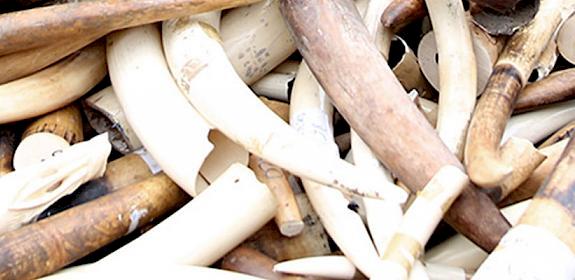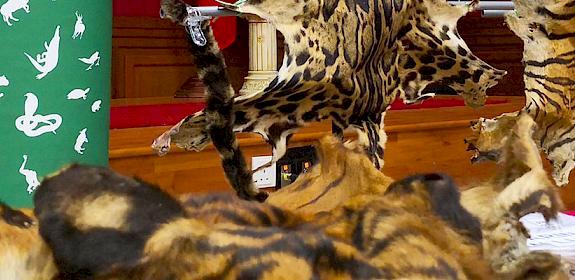No let up in Asia's bear trade
Petaling Jaya, Malaysia, 25th October 2016—A bear cub rescue in Malaysia this week and other recent bear-related seizures in Southeast Asia underscore the severe and continued threat illegal trade poses to bears in the region.
On Saturday, Peninsular Malaysia’s Department of Wildlife and National Parks (PERHILITAN) nabbed a local man outside a hotel in the east coast town of Kuala Lipis who was attempting to sell a month-old female Asiatic Black Bear Ursus tibetanus cub he had offered for sale on Facebook.
PERHILITAN Director General Abdul Kadir Abu Hashim told a press conference today that the man claimed to have acquired the juvenile bear cub from a neighbouring country.
The Asiatic Black Bear is not native to Malaysia and is likely to have entered the country in contravention of the Convention on International Trade in Endangered Species of Wild Fauna and Flora (CITES). Additionally, as a totally protected species under Malaysia’s Wildlife Conservation Act 2010, those convicted of trafficking juvenile and female animals are liable to penalties that can reach MYR200 000 (USD48 000) or a jail term of up to ten years, or both.
Bear cubs previously showed up in TRAFFIC’s five-month study of 14 Facebook groups in Peninsular Malaysia, and in a similar case last March, PERHILITAN seized another bear cub during raids that netted seven illegal wildlife traders operating through Facebook. However, this is apparently the first case involving a live Asiatic Black Bear.
It's clear that poachers, traders and consumers have their target firmly set on Asia’s bears. Arrests such as the one made by PERHILITAN sends a strong message that such crime will not be tolerated
Dr Chris R. Shepherd, Regional Director for TRAFFIC in Southeast AsiaBesides the growing appetite to own bear cubs in Malaysia, other enforcement action across Southeast Asia demonstrates a demand for bears that is not limited to the poaching of cubs for the pet trade.
Dozens of bear parts including gall bladders, teeth and claws were found in a series of raids at the end of August in Peninsular Malaysia. That same month saw the Sabah Wildlife Department arresting four men and seizing eight bear paws and other bear parts in two back-to-back cases.
Cases involving the seizure of bear parts have also cropped up in Viet Nam, Lao PDR and Indonesia in 2016: in April, bear bones were seized from the home of a known wildlife trader in Riau, Indonesia, while bear teeth were found in the possession of a souvenir seller in West Kalimantan. In July, police in Thanh Hoa province, Viet Nam, seized 18 frozen bear legs that were being transported aboard a bus from Lao PDR and in September, enforcement officers in Lao PDR seized bear limbs, gall bladders, claws, fur, teeth and bile from several roadside market stalls surrounding the city of Vang Vieng.
TRAFFIC’s research has consistently shown a demand for Asiatic Black Bears and Sun Bears Helarctos malayanus and their parts in the region. A 2011 report found evidence of widespread illegal sourcing and trade in wild bears in 13 countries and territories in Asia.
Another analysis of hundreds of seizures from across Asia from 2000 to 2011 sounded the alarm on Asia’s ongoing widespread bear trade and the need for international action. During that period a minimum of 2801 individual bears were traded for their parts and derivatives.
“We’re very encouraged by the greater enforcement vigilance we’ve seen in Malaysia and elsewhere in the region. What needs to happen now is for strong penalties to be meted out to convicted traffickers, which can serve as a deterrent. Without this, the dedicated effort of law enforcement agencies becomes less meaningful,” said Shepherd.
TRAFFIC is working to end the illegal trade in bears in the region and encourages members of the public to report suspected wildlife crime through our App, Wildlife Witness. The App can be downloaded for iPhone or Android.




